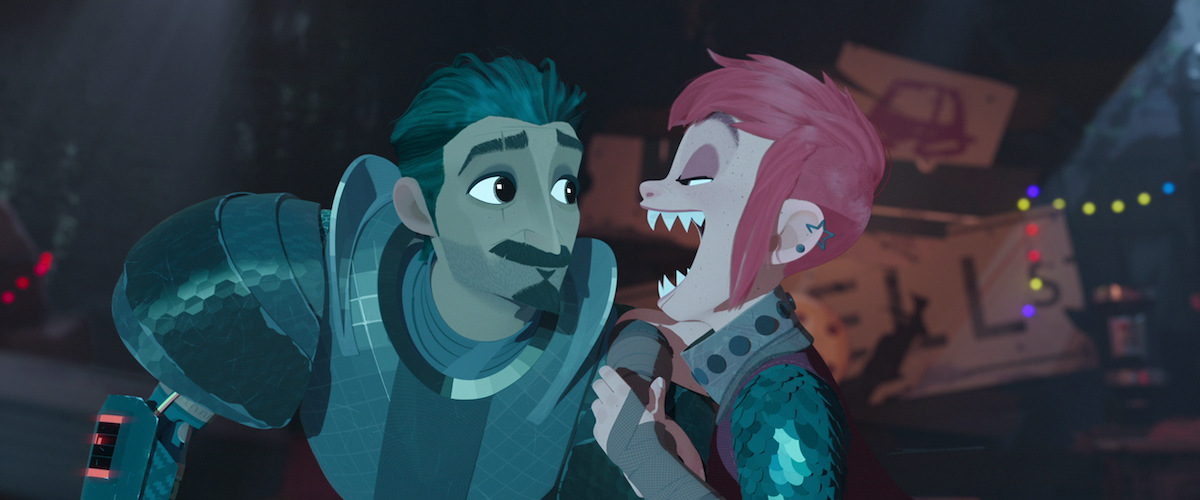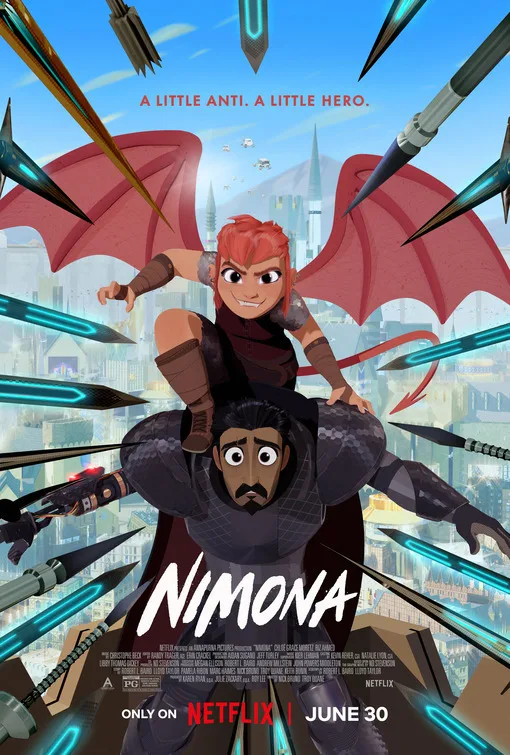A few compelling emotions and themes are suggested but rarely well expressed in "Nimona," a sometimes cute but mostly hyper and overextended animated sci-fi fantasy about the title teenage shapeshifter and her disillusioned (and very literal) knight in shining armor. Overstuffed with Pinterest-ready details and set in the distant future, "Nimona" follows the unlikely duo of the title character (Chloe Grace Moretz), a bubbly, post-manic pixie dream girl, and Ballister Boldheart (Riz Ahmed), a disgraced "medieval"-style knight of some unnamed realm who must defend himself after he's framed for murdering Queen Valerin (Lorraine Toussaint).
"Nimona" feels more like a dramatized checklist of stylistic tics and emotional beats from both Pixar and DreamWorks' animation studios' greatest hits. There's some lightly likable dad-friendly puns, sight gags, and a bunch of angsty declaiming about questioning authority, being true to yourself, and other bumper-stick-ready slogans.
"Nimona" also features a bunch of post-post-punk anthems and punk-adjacent music of variable quality, including at least one Metric song ("Gold Guns Girls") and some guitar riffs by ex-Sex Pistol Steve Jones. The characters, whose designs were partly modeled after the styles of the formative Disney background artist Eyvind Earle and the "minimal realist" illustrator Charley Harper, fly around the screen with enough keenly observed, fluid grace to remind you that many passionate animators made and put serious thought into the making of this movie. Unfortunately, several of the main characters' facial expressions seem more like dutiful mimicry—"Nimona" was based on ND Stevenson's graphic novel—than a convincing vehicle for the characters' emotions. Their hearts are in the right place, but their mouths—and doe eyes, and glass-cutting jawlines—just pay lip service.
Case in point: While Nimona obviously matters to the plot and exhaustively detailed themes, she's eventually prescribed with the sort of backstory that even Nimona, in an early scene, scoffs at. She laughs at Ballister's paternal concern and also shields herself from easy typecasting by waving away his "small-minded questions." The why of Nimona doesn't matter, she says, but she eventually provides an origin story later on, which ostensibly endears her to us even more. She's not a monster, as Ballister fearfully assumes, but a well-meaning misfit. Nimona is also the only friend that Ballister has after the hilt of his sword mysteriously fires a laser at the Queen and instantly kills her.
You might have questions about that abrupt and surprisingly dark plot twist, but not much about "Nimona" is developed beyond precisely enunciated dialogue and well-designed animation. This isn't a bad movie in the sense that it's poorly made. But it often leaves something to be desired whenever the characters talk or muscle their way past the details that might make you want to root for Ballister and his proudly irreverent sidekick. For example, he's got a concerned but fearful partner, Ambrosius Goldenloin (Eugene Lee Yang), a fellow knight who's also different than Ballister in that he's a descendant of the mythic hero Gloreth. Ballister, by contrast, is a commoner, which briefly makes him look like an underdog.
Ambrosius overcomes his wayward sense of duty as he chases after and inevitably tries to protect Ballister from the imperious Director (Frances Conroy), the kingdom's snobby officiating protector. But why is Ambrosius, the kingdom's favorite presumed favorite, not more hung up on Ballister's relatively low upbringing? In other words, why is a movie so clearly trying to be about indoctrination—ignore your programming and trust your inner monster!—only so interested in its characters' feelings?
Nimona should, in theory, synthesize the movie's two modes—leaden speeches and light-hearted chases—but doesn't get to do much beyond defend her right to exist. Her in-your-face character will seem bubbly and spunky to some; others might find her a well-crafted but empty collection of third-hand quirks. She has all the right moves, as when she shape-shifts into various animals and repeatedly saves Ballister from capture and punishment. But when she talks, she sounds more like a tough-talking authorial sock puppet than a righteous adolescent.
It's hard to take a movie like "Nimona" seriously when it often tries to have it all ways. Moretz's performance injects some appreciable irreverence into the movie's stuffy anti-authority narrative, but Nimona's creators go too far out of their way to applaud viewers for knowing that we're watching a fractured fairy tale with rules that were made to be tweaked. Sounds great, but wouldn't you rather watch a movie that's more than a proof-of-concept showcase for its sometimes charming but mostly loud counterprogramming? Nimona is too calculating and savvy to be credible during her big heart-on-her-sleeve moments. She's not a character; she's whatever the scene needs her to be. Clever, sassy, goofy, wounded: "Nimona" is a big mood board.
On Netflix now.




















